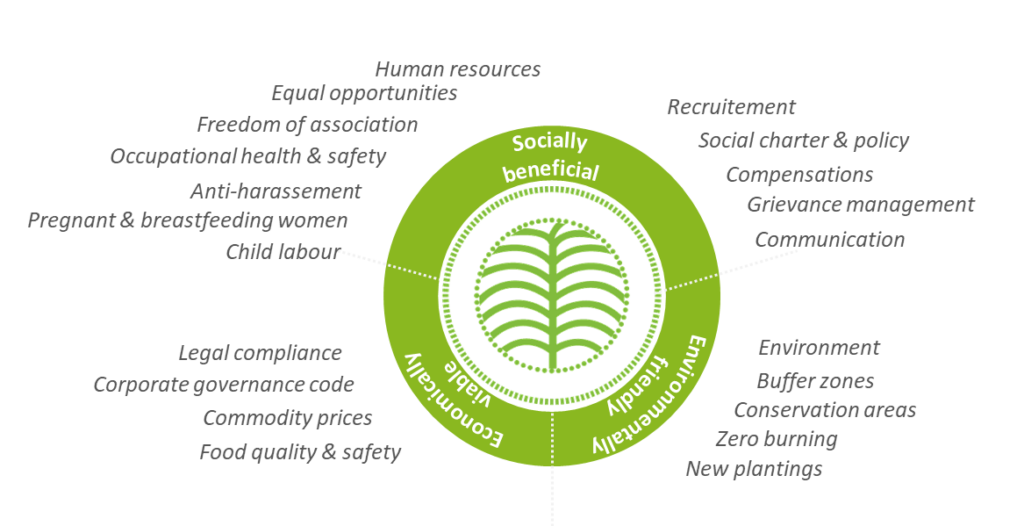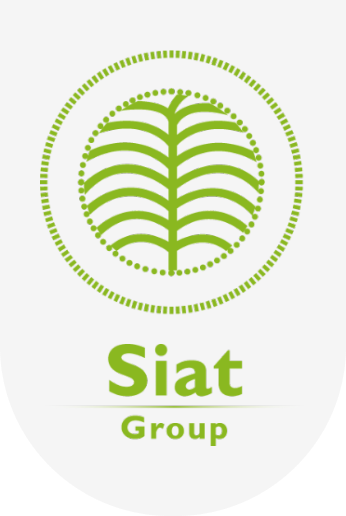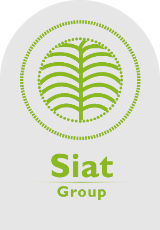Our approach to
sustainability
We are strong believers in continuous improvement and we hold a mirror to ourselves to always do better.
Sustainability should be intentional and is integrated in all what we do. Through its design, the decisions and policies we make every day, our business has become a means to contribute to the Sustainable Development Goals and ultimately building a better world for all.
We are committed to be
part of the solution
The Siat Group was one of the first RSPO members, since 2004. We participated in the development of national RSPO interpretations for Ghana, Gabon and Nigeria ; the latter of which was recently approved and we have ensured timely RSPO certification of our subsidiaries in Nigeria, to join our operations in Ghana, RSPO certified since 2015 and the one of the first African companies able to produce and trade RSPO-certified products since 2016.
At top level, the Siat Group validated several policies clearly defining its strategy and commitments towards the environment, social development, employee protection and respect of the quality demanded by our customers. This resulted in the appointment of an ESG Board Committee.
The creation of the Sustainability Department in 2014 has enabled us to move forward, more specifically by formalising and validating various social, environmental and quality commitments.
Each year Siat allocates an important budget to maintain good relations with the communities and to environmental studies. Hence, we enhance our knowledge and environmental protection by preserving new zones within our concessions each year.We consider the needs of our clients by modernising and certifying our production units on a regular basis. We believe in transparency, and therefore our Sustainability report outlines the results and situation as objectively as possible, revealing the challenges, progress made and discussing future developments.
Policies &
Commitments

Environment
& Conservation
Siat firmly believes in environmentally friendly production. For instance, all factory waste of the oil mills is recycled into the plantation or used as fuel to generate process steam and electricity. CIRAD assists our plantation managers with an integrated pest control and soil fertility management system.
As a major actor in the oil palm and rubber industry, Siat Group is aware of the impact of its activities on the people and on the environment. The Company is committed to undertake all its activities, from the resources to the transformation, in a sustainable manner, thus guaranteeing its partners and customers a responsible production which respects environmental and social values.
Siat is committed through its policies not to cultivate on fragile soils. This includes conservation areas (such as HCV, HCS, swamp, marshy and riparian areas), peat soils and high organic soils (such as Histosols), fragile and marginal soils (such as sandy soils), and slopes above 20° (to prevent soil erosion).
Siat installs cover plants on all its oil palm plantations to limit erosion and improve the soil fertility.
Siat is committed to restoring areas that could have been degraded in the past and to maintaining or increasing the fertility of cultivated soils (for example by returning to the fields organic matter taken during harvesting).
Siat conducts regular surface water, soil and leaves analyses and has contracts with international experts to establish its fertilization programs.
Siat has developed and applies integrated Pest Management (IPM) on all its plantations to rationalize the use of chemicals and avoid soil pollution. No product covered by the Rotterdam or Stockholm conventions, nor any class Ia or Ib product on the WHO list are used.
Siat aims to have at least 10% of its surfaces in conservation areas (see the sustainable development report).
- GHANA GOPDC Kwae – Soils
- GHANA GOPDC Okumaning – Soils
- NIGERIA PRESCO Obaretin – Soils
- NIGERIA PRESCO Ologbo – Soils
- NIGERIA PRESCO Sakponba – Soils
- NIGERIA PRESCO Cowan – Soils
- NIGERIA SNL Ubima – Soils
- NIGERIA SNL Elele – Soils
- IVORY COAST CHC – Soils
- GABON Kango – Soils
- GABON Mitzic – Soils
- GABON Bitam – Soils
- GABON Zile – Soils
- GHANA GOPDC Kwae – Slopes
- GHANA GOPDC Okumaning – Slopes
- NIGERIA PRESCO Obaretin – Slopes
- NIGERIA PRESCO Ologbo – Slopes
- NIGERIA PRESCO Cowan – Slopes
- NIGERIA PRESCO Sakponba – Slopes
- NIGERIA SNL Ubima – Slopes
- NIGERIA SNL Elele – Slopes
- IVORY COAST CHC – Slopes
- GABON Kango – Slopes
- GABON Mitzic – Slopes
- GABON Bitam – Slopes
- GABON Zile – Slopes
Positive
social impact
Besides Siat’s firm ecological commitment, the Group also cares about its social responsibilities. In the catchment areas of its operations, the company assists communities with education and social infrastructure development such as roads, potable water, electricity and dispensaries. These actions aim at creating commitment and stability, which in turn provide security for the Group’s investments. Siat’s objective is to invest each year in community development projects.
Human
Ressources
Siat values its Human Resources and is committed to ensuring fairness, transparency and consistent treatment of all categories of workers. The company has developed the following policies to communicate its values and expectations to all workers. The company expects all its employees, business partners and associates to adhere to these policies. We provide mechanisms that respect anonymity, to identify, prevent, mitigate and address human rights issues and impacts.
For a favorable and fulfilling work environment, the Siat Group issues a code of conduct with values oriented towards the respect and the integrity of people. Consequently, Siat Group commits to:
- Ensure that the recruiting process is done objectively with no discrimination of any nature such as, and not limited to, religion, gender, ethnical background or physical appearance of the candidate,
- Promoting career development by encouraging internal promotion,
- Enhance staff’s capabilities through suitable training programs,
- Encourage and facilitate representative bodies of workers,
- Ensure satisfying living conditions for all workers and families by providing acceptable housing with access to electricity and water,
- Provide regular medical check-ups for the staff and ensure that they and their families have access to proper medical care,
- Facilitate access to healthy food, where necessary,
- Ensure that transport of workers is done in suitable and safe vehicles,
- Do the necessary to minimise occupational risks on all industrial sites,
- Respect the rights and obligations of women during the maternity period with regard to maternity leave and breast feeding.
- Comply with all the recommendations concerning health, safety, and environmental issues,
- Not to access his/her workplace under influence of alcohol and not to introduce illicit substances or alcohol within the company premises,
- Not to exercise moral or physical pressure (threats, violence, insults, sexual harassment, etc.) on the staff,
- Not to use company property for personal purposes, without the authorization of the employer,
- Not to hunt or transport protected animal species within Siat’s concessions,
- Not to incite, through meetings, conversations, petitions, troubles and disorders within Siat’s concessions,
- If pregnant or breastfeeding, workers commit not to accept any work position exposing her to hazardous chemical products.
These goals are only achievable with the involvement and commitment of all workers and stakeholders of Siat Group of Companies.
Siat is committed to preventing any form of human rights abuse as enshrined in the constitutions of the countries it operates in and the international human rights guidance [1]. The group’s key compliance focuses are:
- Respect for employees’ and stakeholders’ human rights. Prohibition of retaliation against human rights defenders and whistle blowers;
- Respect for local authorities: respect of the rights, cultures, customs and values of host communities [2]; and
- Prohibition of extra-judicial intimidation and use of mercenaries and para-militaries in our operations;
[1] UN Guiding Principles on Business and Human Rights; ILO Declaration on Fundamental Principles and Rights at Work [2] UN declaration on the right of indigenous people
Siat aims to promote and protect the reproductive rights [1] of all its workers, especially women by:
- Favoring their access to sexual and reproductive health information that will provide them with the tools to make informed choices conducive to their health;
- Respecting the rights of women during the maternity period with regards to maternity leave and breast feeding; and
- Ensuring that pregnant or breastfeeding women do not carry out work which exposes them to hazardous chemical products.
[1] Reproductive rights are defined as legal rights and freedom relating to reproduction and reproductive health, for couples and individuals, as well as freedom to decide freely and responsibly the number, spacing and timing of children.
Siat is committed to ensuring that any form of discrimination based on race, ethnic origin, national origin, religion, disability, gender, sexual orientation, union membership, political affiliation, age or any other social condition, is prohibited [1].
In the conduct of its business the company endeavors to:- Operate a workable, flexible recruitment system that ensures that each person has equal access to employment based on merit, qualification, experience, skill, and knowledge;
- Communicate information on minimum entitlements for wages and conditions of employment to all employees in the appropriate language and ensure that they benefit from it;
- Give preference to members of local communities where candidates for employment are of equal merit;
- Ensure mechanisms are in place for identifying affected groups and responding to complaints of discrimination; and
- Protect migrants [2] from abusive employment and to treat them fairly.
[1] ILO conventions on remuneration and discrimination[2] ILO Convention Migrant workers
Siat prohibits all forms of workplace violence and harassment, particularly sexual harassment [1], whether engaged by workers or other stakeholders operating within SIAT Estates. Harassment is defined as unwelcome words, conduct or actions that are offensive, embarrassing, humiliating or demeaning to a worker or group of workers. Workplace violence is the exercise or attempt of physical force by a person against another.
The company will ensure that:
- Workers are aware of, and understand that acts of violence or harassment are considered a serious offence for which necessary action will be imposed;
- Those subjected to acts of violence or harassment are given available recourse to pursue a complaint;
Siat is committed to investigating reported incidents of violence and harassment in an objective and timely manner, taking necessary action; and providing appropriate support for victims.
[1] Guide on Prevention of Sexual Harassment in the Workplace
Siat respects and supports the right of all categories of workers to freedom of association and to collective bargaining. The company commits to implementing this policy by:
- Allowing all workers, without distinction, to form and/or join any kind of association [1] of their own choosing;
- Recognizing workers’ associations as partners for the purpose of reaching consensus relations between the company and its workforce.
- Allowing workers associations to conduct their activities without interference; and
- Not tolerating intimidation, reprisal or discrimination of any kind against association members or representatives or those advocating membership for the association.
[1] ILO convention Freedom of Association and protection of right to Organize
Siat subscribes to a zero tolerance policy of child labour or exploitation of children in any of its operations.
The company commits to securing a better future for children by:
- Only employing workers who can prove that they are above 18 years of age;
- Immediately discontinuing the employment of a child in the event of an occurrence of child labour being discovered;
- Discouraging workers whose own children are encouraged to work with the family when they are of school age and/or doing unreasonable tasks for their capabilities;
- Encouraging all workers to school their children; and
- Refraining from engaging in business with partners who resort to using child labour in their operations
Impact
Assessments
Siat Group has committed to assess all its estates using different tools and creating action plans based on the results of assessments like: High Conservation Value and High Carbon Stock Approach (based on HVC RN methodologies), Land Use Change Analysis, New Planting Procedure, GreenHouse Gas calculation (based on RSPO Methods), Social and Environmental assessment (based on RSPO and national regulation when mandatory).
- GHANA GOPDC – 2010 Proforest
- NIGERIA PRESCO Cowan – 2017 Proforest
- NIGERIA PRESCO Obaretin – 2017 Proforest
- NIGERIA PRESCO Ologbo – 2008 CIRAD
- NIGERIA PRESCO Ologbo – 2015 Proforest
- NIGERIA PRESCO Ologbo – 2008 CIRAD rev. by Proforest
- NIGERIA PRESCO Ologbo Ext I – 2013 Proforest
- NIGERIA PRESCO Ologbo Ext II – 2015 Proforest
- NIGERIA PRESCO Sakponba – 2017 Proforest
- NIGERIA SNL Elele – 2017 Proforest
- NIGERIA SNL Ubima – 2017 Proforest
- GHANA GOPDC – 2017 SAL
- NIGERIA PRESCO Obaretin Cowan Ologbo – 2004 Blue Fin
- NIGERIA PRESCO Ologbo – 2014 Foremost
- NIGERIA PRESCO Sakponba – 2017 Foremost
- NIGERIA SNL Ubima Elele – 2017 Foremost
- CAMBODGE SELADAMEX – 2011 Master Plan
- CAMBODGE SWIFT – 2014 CES co
- IVORY COAST CHP – 2016 SGS
- GABON BITAM – 2015 Terea
- GABON KANGO – 2017 Terea
- GABON MITZIC – 2014 Terea
- GABON ZILE – 2015 Terea
Renewable
Energy
Our future is turned towards energy mixes and the use of renewable energies. In recent years, the Siat Group has invested heavily in these fields. In 2018, the group was awarded the prize of: “Best International Agricultural Plant – Siat, First Large Scale AD & Biogas Plants in West Africa: A Hope for the Palm Oil Sector”, awarded jointly by the World Biogas Association and the United Kingdom’s Anaerobic Digestion & Bioresources Association (ADBA).
This award recognizes the two biogas plants installed at GOPDC (Ghana) and Presco (Nigeria) to recover, by anaerobic fermentation, methane from organic sludge contained in oil mill effluents. This very strong greenhouse gas is captured, and while used as energy, effluent and sludge are treated.
In 2019, GOPDC and CHC was awarded the prize of: “Energy Globe Award”, respectively for Biomethanation and Cogeneration. It is awarded annually to projects focusing on energy efficiency, renewable energies and the conservation of resources.
Sustainability
Reports
We publish our Sustainability Reports since 2014 and GHG Emission Reports since 2016. These are easy to read and transparent while communicating as many quantified results as possible.
Policies, codes and various documents are available in the respective sections of this website, usually in English and in French.

